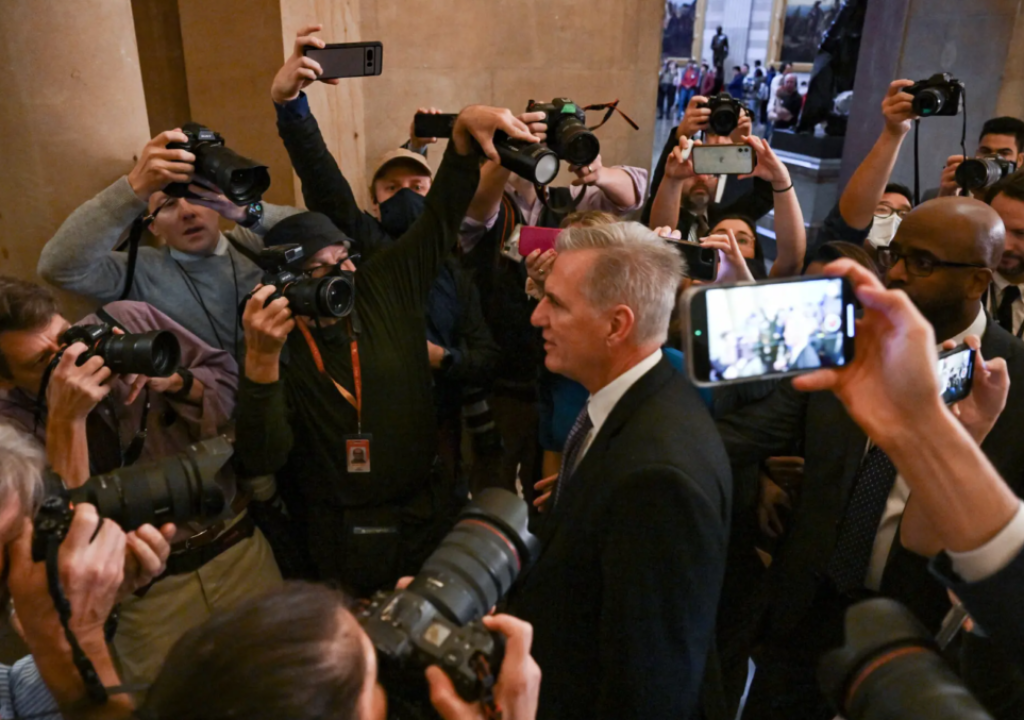JF In the News: ‘Nobody Is in Charge’: A Ragged GOP. Stumbles Through the Wilderness
As the chaos and confusion on the House floor continued for a third day, Republicans made it abundantly clear who is leading their party: absolutely no one.
From the halls of Congress to the Ohio Statehouse to the backroom dealings of the Republican National Committee, the party is confronting an identity crisis unseen in decades. With no unified legislative agenda, clear leadership or shared vision for the country, Republicans find themselves mired in intraparty warfare, defined by a fringe element that seems more eager to tear down the House than to rebuild the foundation of a political party that has faced disappointment in the past three national elections.
Even as former President Donald Trump rarely leaves his Florida home in what so far appears to be little more than a Potemkin presidential campaign, Republicans have failed to quell the anti-establishment fervor that accompanied his rise to power. Instead, those tumultuous political forces now threaten to devour the entire party.
Nowhere was that on more vivid display than the House floor, where 21 Republicans on Thursday stymied their party from taking control for a third day by refusing to support Rep. Kevin McCarthy’s bid for speaker.
After McCarthy failed on his seventh attempt to win the leadership position, the House appeared in a state of limbo, with Republicans continuing to negotiate among themselves about whether to keep voting or adjourn for the weekend.
“Nobody is in charge,” John Fredericks, a syndicated right-wing radio host and former chairman of Trump’s 2016 and 2020 campaigns in Virginia, said in an interview. “Embrace the chaos. Our movement is embracing the chaos.”
That ideology of destruction defies characterization by traditional political labels like moderate or conservative. Instead, the party has created its own complicated taxonomy of America First, MAGA and anti-Trump — descriptions that are more about political style and personal vendettas than policy disagreements.
This iteration of the Grand Old Party, with its narrow majority in the House empowering conservative dissidents, represents a striking reversal of the classic political maxim that Democrats need to fall in love while Republicans just fall in line.
“The members who began this have little interest in legislating, but are most interested in burning down the existing Republican leadership structure,” said Karl Rove, the Republican strategist who embodies the party’s pre-Trump era. “Their behavior shows the absence of power corrupts just as absolutely as power does.”
Fredericks, who is typically one of the most aggressive pro-Trump voices in the conservative news media, said that even the former president’s renewed endorsement of McCarthy on Wednesday would do little to shore up the would-be speaker’s support.
Indeed, none of McCarthy’s opponents reversed course after receiving calls from Trump encouraging them to do so. Rather, Rep. Lauren Boebert of Colorado took to the floor Wednesday afternoon to urge her “favorite president” to change his view and tell McCarthy to withdraw his bid.
“The movement has eclipsed its Trump leadership,” Fredericks said on Wednesday, when 20 House Republicans opposed McCarthy’s bid. “We found 20 new leaders.”
That’s a very different definition of a leader from the traditional image of a legislator muscling policy through Congress and reshaping American life. In the new conservative ecosystem, leaders are born of the outrage that drives news coverage on the right and fuels online fundraising.
Read the full article from the New York Times here: https://www.nytimes.com/2023/01/05/us/politics/republican-party-leadership.html
ADVERTISEMENT



Richmondgirl
January 8, 2023 @ 11:54 am
John, you’re spot on as usual. I think the most important aspect of this outcome is that Trump is not the man to lead the Party any longer. At least to me he’s not. His political judgment is flawed and we need a leader with clear, principled vision to get our country back. So far, that leader has not emerged. But for me it isn’t Trump.